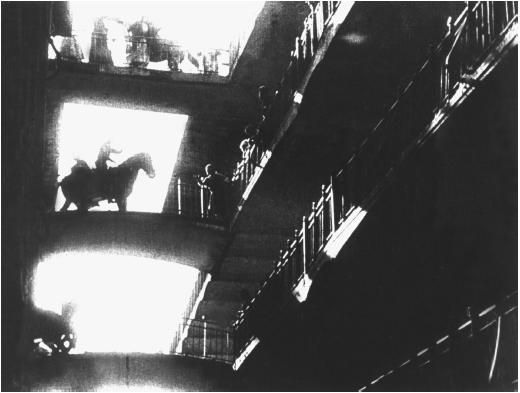
Anthology Film Archives' "Essential Cinema" series is one of the more off-putting, elitist endeavors imaginable: "Let's screen already obscure, unlikable, and forgotten films... but in a way that renders them unintelligible!" The Dreyer screenings of last week have now given way to Eisenstein's masterworks, and nary a subtitle in sight. For this I applaud them. I may not have the eye for technical aspects (a good or bad transfer, 35 mm vs 70 mm, etc.), but without real film, untampered with and played "straight," as it were, one never *could* begin to distinguish these things. And although I have no interest in making films, I regard every Essential Cinema screening of a classic silent film as of the utmost importance in my education in filmmaking.
It is trivial to discuss the place of Strike within the canon; we may consider it sufficient to mention that Battleship Potemkin and Ivan the Terrible have both placed in the Sight and Sound polls, while Strike and October have not. For myself, I find the three silent films virtually interchangeable in (ludicrously high) quality. Ivan the Terrible may just be the best film ever made. But let me make a little case for Strike as a film you cannot go another day without seeing.
There are no characters to speak of. The plot is one-dimensional. The "meaning" is transparent and blunt. These are qualities of film that we have learned to ask for. Strike dashes these assumptions. Characters are shown to be unnecessary, and perhaps even a juvenile addiction of viewers. Complexity of plot appears weak and trivial. Subtlety seems like mediocrity, a compensation for poor sets and uninteresting shots. This was a direction film did not take. We have long thought of film as a novelistic or narrative genre; failing that, a dramatic one. Strike is symphonic. It *builds*. Motifs are repeated and varied. Individual voices are unimportant. Interludes are purely for tonal effect. And so on.
Like L'Atalante and La Belle et la Bete, I wish I had seen Strike dozens of times as a child. Far from the dour Marxist propaganda one might imagine it to be, one has rarely seen such fun had in filmmaking. One feels very far away from the formalism of Abel Gance's Napoleon, or the realism of Alexander Nevsky. Those are boring films that are "good for us" to watch. Strike, one of the more didactic films ever made, is anything but the chore that implies. And like the greatest films, one begins to forget, while watching it, that reality itself does not look like this. As morons correctly note, in a foreign film, you stop noticing the subtitles after ~ five minutes. In the best moments of Strike, I have never felt as more of a question about *reality*, nudging my friend, "Who are these guys?... Ah. Up to no good, it seems."
No comments:
Post a Comment